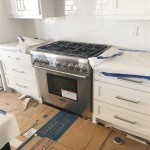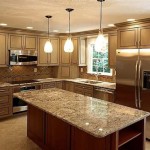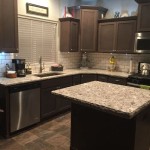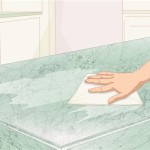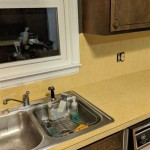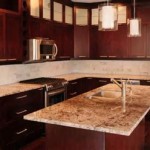Caring for Butcher Block Countertops: A Comprehensive Guide
Butcher block countertops offer a warm, inviting aesthetic to any kitchen. Their natural beauty and inherent functionality make them a popular choice among homeowners. However, maintaining these countertops requires specific care to preserve their longevity and prevent damage. This article provides a comprehensive guide to effectively caring for butcher block countertops, ensuring they remain a durable and attractive feature in your kitchen for years to come.
Butcher block is essentially a collection of wood pieces glued together to form a solid surface. Different wood types are utilized, including maple, walnut, oak, and cherry, each offering varying degrees of hardness, grain patterns, and color. The choice of wood impacts the final appearance and, to some extent, the maintenance requirements. For instance, harder woods like maple and walnut are more resistant to scratches and dents than softer woods. The type of finish applied also significantly influences the maintenance routine.
Proper care begins with understanding the specific needs of butcher block. Unlike laminate or stone countertops, wood is a porous material, making it susceptible to moisture absorption and staining. Regular cleaning, proper oiling, and prompt attention to spills are crucial for preventing these issues. Furthermore, avoiding excessive heat and sharp objects will protect the surface from damage. The following sections will detail the key aspects of butcher block countertop maintenance.
Regular Cleaning: Maintaining Hygiene and Appearance
Consistent cleaning is paramount to maintaining the hygiene and appearance of butcher block countertops. The frequency depends on usage, but a daily wipe-down is generally recommended. This is especially important in food preparation areas. It is important to select appropriate cleaning agents that will not damage the wood or strip the oil finish. Harsh chemicals should be strictly avoided.
For daily cleaning, a mild dish soap diluted in warm water is typically sufficient. Apply the soapy water with a soft cloth or sponge, ensuring to wipe in the direction of the wood grain. Avoid using abrasive scrubbers or scouring pads, as these can scratch the surface. After wiping with the soapy water, rinse the surface with a clean, damp cloth to remove any soap residue. Thoroughly dry the countertop with a clean towel. Leaving water on the surface can lead to water spots and warping.
For more stubborn stains or food residue, a slightly stronger cleaning solution may be necessary. A mixture of white vinegar and water (1:1 ratio) can effectively remove many stains. Apply the vinegar solution to the affected area, let it sit for a few minutes, and then wipe it clean. Baking soda paste can also be used for removing stains; however, it should be used sparingly and with caution, as it can be mildly abrasive.
Sanitizing is another important aspect of cleaning butcher block countertops. While soap and water remove dirt and grime, they don't necessarily kill bacteria. For sanitizing, a diluted bleach solution (one tablespoon of bleach per gallon of water) can be used. Apply the solution, let it sit for a few minutes, and then rinse thoroughly with clean water. Ensure the countertop is completely dry after sanitizing to prevent mold and mildew growth. Alternatives to bleach like hydrogen peroxide can be used, but effectiveness may vary based on the concentration and dwell time.
The effectiveness of cleaning and sanitizing hinges on preventing food particles from accumulating in the first place. Promptly wiping up spills and cleaning up after food preparation is essential. Over time, neglecting spills and stains can lead to discoloration and potential bacterial growth deep within the wood.
Oiling Butcher Block: Preserving Moisture and Preventing Cracking
Oiling is a crucial step in maintaining butcher block countertops. Wood possesses a natural tendency to dry out, leading to cracking, splitting, and warping. Regular oiling helps to prevent these issues by replenishing the natural oils in the wood, keeping it moisturized and supple. The type of oil used is important, as some oils can become rancid or leave a sticky residue.
Food-grade mineral oil is the most commonly recommended oil for butcher block countertops. It is odorless, tasteless, and non-toxic, making it safe for food preparation surfaces. Other options include beeswax and mineral oil blends that provide a protective layer along with moisturization. Avoid using cooking oils like olive oil or vegetable oil, as these can become rancid and attract bacteria, leaving an unpleasant odor.
The frequency of oiling depends on several factors, including the type of wood, the climate, and the usage of the countertop. New butcher block countertops typically require more frequent oiling initially, perhaps once a week for the first few weeks, to saturate the wood. After that, oiling can be reduced to once a month or as needed. A good indicator that the butcher block needs oiling is when the surface appears dry or feels rough to the touch.
To oil the butcher block, pour a generous amount of mineral oil onto the surface. Use a clean cloth or paper towel to spread the oil evenly over the entire countertop. Allow the oil to soak into the wood for several hours, or preferably overnight. The longer the oil can soak in, the better. After the soaking period, wipe off any excess oil with a clean cloth. Repeat this process if the wood still appears dry. It’s important to ensure the oil is fully absorbed; a greasy surface can attract dust and be unpleasant to work on.
Proper oiling not only prevents cracking and warping but also enhances the natural beauty of the wood grain. The oil penetrates the wood fibers, bringing out the rich colors and patterns. In addition, oiling creates a barrier that helps to repel water and stains, making the countertop easier to clean and maintain.
Preventing Damage: Protecting Against Scratches, Heat, and Water
Preventing damage is crucial for extending the lifespan of butcher block countertops. While they are durable, they are still susceptible to scratches, heat damage, and water damage. Taking precautions to protect the surface will help to maintain its appearance and prevent costly repairs.
Scratches are a common concern on butcher block countertops, especially in high-use areas. To minimize scratches, always use cutting boards when chopping or slicing food. Avoid cutting directly on the countertop surface. Sharp knives can easily leave marks, especially on softer woods. Similarly, avoid dragging heavy objects across the countertop, as this can also cause scratches. If scratches do occur, they can often be sanded out and the area re-oiled. However, deep scratches may require professional repair.
Heat damage is another potential problem. Butcher block countertops are not heat-resistant like stone or metal. Placing hot pots, pans, or dishes directly on the surface can cause scorching or discoloration. Always use trivets or hot pads to protect the countertop from heat. Be particularly careful with slow cookers or other appliances that generate sustained heat. Prolonged exposure to heat can also dry out the wood, leading to cracking.
Water damage is one of the most significant threats to butcher block countertops. As a porous material, wood readily absorbs water, which can lead to swelling, warping, and mold growth. To prevent water damage, promptly wipe up any spills. Pay particular attention to areas around the sink and faucet, where water is more likely to accumulate. Use mats or dish-drying racks to prevent water from pooling on the countertop. Avoid leaving wet cloths or sponges on the surface. If the countertop becomes saturated with water, dry it thoroughly with a clean towel and consider reapplying mineral oil to help seal the wood.
Regular inspection for water damage is crucial. Look for signs of swelling, discoloration, or mold growth, especially in joints and seams. If you notice any of these signs, address the problem promptly. Minor water damage can often be repaired by sanding and re-oiling the affected area. However, severe water damage may require professional repair or replacement.
Beyond these specific preventative measures, consider the overall environment of the kitchen. Maintaining a consistent humidity level can help to prevent the wood from drying out or becoming too moist. Avoid exposing the countertop to extreme temperature fluctuations, as this can also cause damage. By taking these precautions, you can significantly extend the lifespan and maintain the beauty of your butcher block countertops.

The Complete Guide To Maintaining Butcher Block Countertops

The Complete Guide To Maintaining Butcher Block Countertops

How To Take Care Of Butcher Block Countertops And Maintenance

Butcher Block Finishing Care Forever Joint Tops
How To Care For Butcher Block Countertops Floor Decor Blog

How To Care For Butcher Block

How To Care For Butcher Block Countertops A Couple Cooks

How To Protect Your Butcher Block Countertops

The Complete Guide To Maintaining Butcher Block Countertops

Using Mineral Oil Organic Beeswax On Butcher Block
See Also

